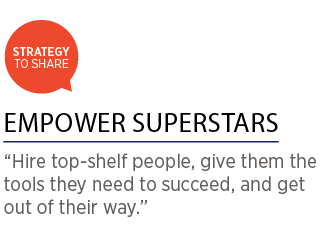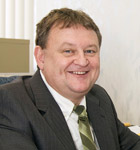 After graduating from law school and completing a stint with the US Army, James J. Tanous accepted a position as an associate with a reputable law firm. He was quickly named partner, and remained with the same firm for more than 35 years. Today, he draws on the skills and experiences he acquired along the way, and serves as executive vice president and general counsel for a Fortune 500 company, Erie Indemnity Co., in Erie, Pennsylvania.
After graduating from law school and completing a stint with the US Army, James J. Tanous accepted a position as an associate with a reputable law firm. He was quickly named partner, and remained with the same firm for more than 35 years. Today, he draws on the skills and experiences he acquired along the way, and serves as executive vice president and general counsel for a Fortune 500 company, Erie Indemnity Co., in Erie, Pennsylvania.
How did your education and early career path lead you to your current role as general counsel at Erie Indemnity Co.?
I was born and raised in Olean, New York, and graduated from the University of Virginia School of Law in 1972. After a six-month tour of duty with the US Army, I accepted a position as an associate with a law firm—Jaeckle Fleischmann & Mugel—in Buffalo, New York. In 1976, I was made a partner, and I remained with the firm for nearly 35 years.
During my time in private-law practice I worked with various insurance company clients. My involvement in their corporate, regulatory, and securities matters proved useful when I accepted my current position as general counsel for Erie Indemnity Company—the attorney-in-fact for a large property/casualty insurance company. Also, during my time with Jaeckle Fleischmann, I was chairman of the law firm and a member of its governing executive committee.
How do you fulfill the role of chairman for the Insurance Federation of Pennsylvania?
In effect, it’s a trade association for insurance companies. We’re the primary spokesperson for the property/casualty and life-insurance companies in Pennsylvania. I’ve served on the board for five years, and my role as chairman is to work with the Federation’s CEO to set an agenda and organize and conduct meetings. I fulfill the classic role of chairman to rally the troops to carry forward the agenda.
What strategies do you implement for success?
I hire intelligent, top-shelf, hardworking people with high moral standards. I give them the tools they need to do their jobs, and then I get out of their way.
Are there specific tools a lawyer need to achieve success?
First of all, a lawyer needs a passion for knowledge. This is a learned profession that is embedded in ethical standards and built on an ever-growing base of information. You can’t come into this profession disinterested. You must have a passion to know as much as possible. A lawyer needs a passion for knowledge before persuasive powers or any other skills can apply.
Secondly, tolerance is a necessary tool for success. Tolerance develops when, in hindsight, what you thought was the answer turned out not to be the best answer. When you have the patience to listen to other people and give them credence, you demonstrate tolerance. When you only listen to your own beliefs, you ultimately short circuit yourself. But when you learn as much as you can from diverse viewpoints, you gain more information than you would if you were less tolerant.
Another important tool for success is tenacity, which is the ability to search for more than one answer. I advise lawyers to refuse to accept a simple answer or the opposing party’s persuasive position. Display a high dose of skepticism and keep pushing. When you truly believe in a position, tenacity enlightens you that the first and second defeats aren’t the end result.
Lastly, integrity is required for success. Integrity is not intellectual or physical, and it can’t be measured. Rather, integrity is evidenced by self worth and internal standards.
Describe your toughest challenge.
Balancing work/life time demands. If you’re the marrying kind, marry a spouse who understands you have passion not only for your family, but also for your profession. And, if you’re an employer, understand that your employee’s spouse and family play an important role. Sometimes I think what an individual does isn’t as important as with whom an individual associates. I’m fortunate because when I worked for a law firm, I was my own boss. Today, I work for a Fortune 500 company with more than 4,000 employees, but we’re very sensitive to people’s need to live a full life. When you’re like me and love the work that you do, you need to consciously pull yourself away from it.


